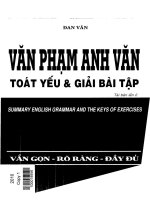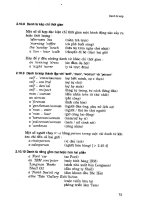Văn Hóa Văn Minh Anh (Eng.Ver)
Bạn đang xem bản rút gọn của tài liệu. Xem và tải ngay bản đầy đủ của tài liệu tại đây (265.42 KB, 8 trang )
PREHISTORY
+ 2000 years ago: Iron Age Celtic culture (North West Europe islands)
+ For nowadays British, the prehistory is the secret by this period’s architecture.
+ Wiltshire has 2 architectures in South-Western England
ROMAN PERIOD
+ The roman province, where the Romans imposed their culture: Roman dress & use Latin language
THE EIGHTEENTH
CENTURY
- In 1707, Scottish parliament was dissolved from the Act of Union. Some of it members moved to English and Welsh
parliament. two kingdoms: United Kingdom of Great Britain. After then, Scotland retained the law whose is similar to
continental European system and maintained up to now.
- Politics seemed stable in this century since Monarch and Parliament got on well each other:
+ Monarch had patronage (ability to give people jobs, control election, have voting habits).
+ Parliament had a separation into two groups:
• The first is Whigs, which was political descendant of parliamentarians.
• The second is Tories, which based on monarchy and Anglican church.
Beginning of periods of party system in Britain.
THE EIGHTEENTH
CENTURY
- Politics in highland of Scotland had a great change: the Celtic life was completely destroyed by
the twice attempts to put Catholic Stuart monarch back on the throne.
- There are also many developments in this century such as: industrial manufacture, transport.
- Unlike the north of Britain, although the south of Britain was not an industrial center, it was a
business and trading center.
In this century, the power relied on the land which monarchs were possessing so there
were many mansion built.
THE NINETEENTH
CENTURY
- Queen Victoria :
+ Confirmed powerlessness.
+ Became a British symbol of success in the world.
+ She devoted the throne to her husband, Prince Albert.
-Not long before, England lost many its colonies.
- At the start of 19
th
century, Britain was locked in the war with France.
- After the war, Britain made a big empire.
- There was a failed potato crop 2 years in a row so a big famine happened soon.
- By the end of the century, the remaining population had switched to English as their first language.
THE NINETEENTH
CENTURY
- Britain settled Canada, Australia, New Zealand, India , and Caribbean which is earlier settlement and except South
Africa
- The head of government is Vicerory which is similar to monarch.
- The colonization had many issues around the growth of empire such as: Settlement, commerce, military. The main
purpose is to have many colonies, not to govern them.
- The end of the century, there was a destiny, discrimination between people in city and landowners.
- As a result, there were some revolutions about slavery, laws against people, protection laws. However, people in
town or city feel unpleasant since the polluted surroundings.
- Many writers and intellectuals protested against this new style of life.
THE TWENTIETH
CENTURY
- Creation of Irish people:
+ Internal self-government.
+ Complete independence.
+ Many protestants in Ulster in the north of Ireland.
- Because of not want to live in a Catholics government, the British partitioned the country between 2 groups:
+ Catholic:
• In the South of Britain
• Want to be independent
• Savage repression of the “Easter Rising” happened in 1916.
• Eventually, 1922, the south became independent from Britain.
+ Six countries:
• Became 6 provinces of Britain in North Ireland.
- In the first 20 years of 20
th
century, Britain had extremism:
+ Women wanted to suffragette.
+ Signal to disobey the government.
+ Had many opposite opinions such as: …
+ The rather un-British climate of extremism died out.
THE TWENTIETH
CENTURY
- 1919 less empire, more confederation.
- A couple years later, Britain lost most of its oldest colonies (the creation of Northern Ireland).
- 1956, British & French stopped Egyptian government.
- 1950, USA, Soviet Union, & Britain had a great corporation in the conference.
- 1962, the effect of the peace of the global since Cuban missile crisis.
- 1974, Cyprus was invaded by Turkey.
- 1997, Hong Kong was removed to China by Britain.
- The start of 20
th
century, Labour party replaced Liberal party.
liberals >< Conservatives.
- 1926, can hold a General Strike
- 1930-1980: Trade Union Congress
- 1900, 2000,… something synonymous in some start of the centuries is to have high unemployment rate.









